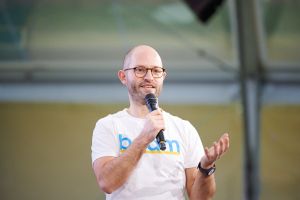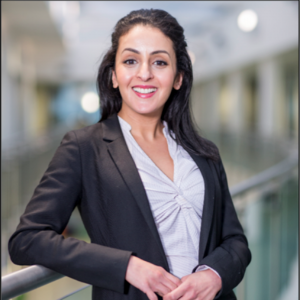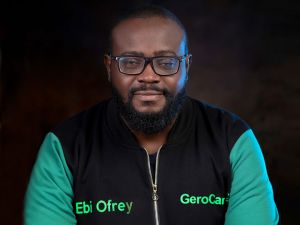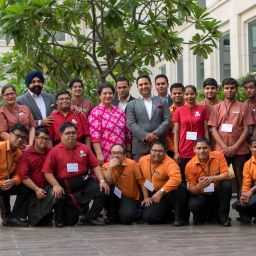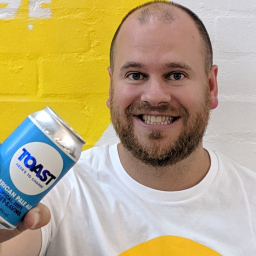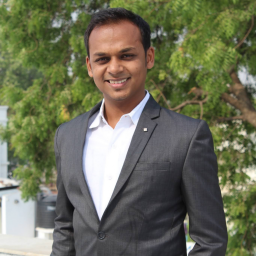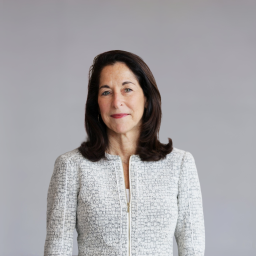Meaningful Business (MB:) Please tell us a bit about your background.
Alex Stephany (AS): My first proper job was as a corporate lawyer at Clifford Chance before a stint in consulting. I was pretty bad at both jobs truth be told! But then hustled my way onto the tech scene through countless Meetups and coffees. I was in the process of starting a marketplace for independent retailers (much like Trouva) before taking up an offer at a VC-backed startup, JustPark, as COO to accelerate my learning even more.
A year later I became CEO and led JustPark’s equity crowdfunding campaign to raise £1 million on CrowdCube. It ended up being the largest ever crowdfunding campaign for a tech startup at the time, raising £3.5m. I remember thinking ‘what if we could use this powerful model of crowdfunding for social good?’ That idea found an outlet several years later in Beam.
MB: What led you to start Beam?
AS: Four years ago, I got to know a homeless man at my local Tube station. I’d buy him cups of coffee and pairs of thermal socks when it was getting cold. At one point, he disappeared for weeks on end. When he reappeared, he looked years older. He told me he’d had a heart attack and had just come out of hospital. Despite the well-meaning gestures from myself and no doubt others, he was in a worse position than ever.
So I began to ask myself what it would take to make a lasting difference to this man’s life. He had never had a job, and was illiterate. For me, the answer lay in empowering him with the skills and training needed to sustainably support himself. Of course, that would cost far more than coffees or socks – but what if everyone chipped in?
The idea of crowdfunding employment training for homeless people was born. Over the following nine months, I developed the model working with homeless people and charities. Beam launched in October 2017.
MB: What is the problem you are trying to solve?
AS: Right now, Beam is focused on solving homelessness in London. Our wider mission is to create equality of opportunity at scale so that everyone has the chance to be amazing. From refugees like Abdullah, to single mums like Regina, we want to give everyone the chance to be amazing. In the future, we plan to help many more disadvantaged groups who face social inequalities, from those with disabilities to prison leavers.
Alex Stephany, Founder & CEO, Beam
MB: What is your biggest challenge right now?
AS: Ordinarily, we would aim to support our beneficiaries into an array of careers – from electricians to barbers. However, due to COVID-19, a lot of these traditional jobs were no longer viable, as many training centres shut down or companies were introducing hiring freezes.
Our response was to instead focus on supporting our beneficiaries into key worker roles, which had seen a surge in demand during the pandemic such as healthcare assistants, warehouse operatives, carers, supermarket assistants and cleaners. We launched a campaign around London, encouraging members of the public to #FundAFuture for a homeless person in a career that was in high demand.
The flexible nature of our model allows us to respond to unforeseen challenges quickly and dynamically. Because of this, we’ve helped over 100 homeless people into key worker roles since the beginning of the pandemic.
We’re also growing rapidly and have big ambitions to scale Beam to as many people as possible. This means we need to hire the smartest people and this uses up a lot of resources. But it’s a challenge that we’re taking in our stride, and since the first national lockdown we have grown our team by almost 50%! If you’re looking to join the UK’s top Tech for Good startup, we’d love to hear from you! [https://beam.org/careers]
MB: What is your vision for the future of your business?
AS: Right now, we want to reach as many homeless people as possible, and empower them into stable work. We’re doing this by building technology that is just as good as Spotify and Netflix, but for the most disadvantaged people in society. The best way for us to achieve this is to expand out of London and into other cities – not only within the UK but further afield. We are confident that our model is scalable and we’re looking forward to moving in this direction in the next year or so!
Additionally, we believe that Beam has the potential to support a greater number of disadvantaged groups in the future. For example, care leavers, ex-convicts, those at risk of radicalisation, and disabled communities would all benefit greatly from the crowdfunding model.
MB: What is your advice to other leaders who want to combine profit and purpose?
AS: For companies wanting to combine profit and purpose, there are a number of factors at play. Firstly, collaboration is crucial. Social impact is best achieved when everyone is working to their strengths. That’s why we work with over 50 local authorities and charities in London who regularly refer individuals to our service. Secondly, don’t forget to meet with and listen to the people you’re trying to positively impact. Back when Beam was getting started, we spent about nine months building the model with the input of people who had experienced homelessness and a group of London-based charities.
Finally, make sure you’ve got a system in place to measure your social impact. Your company can’t celebrate progress without knowing its financial numbers, so make sure you have a couple of basic key performance indicators related to social impact that you can actively measure and work on. For example, Beam uses social metrics to measure the positive social impact we are creating. We share these metrics publicly on our Transparency Dashboard and they update in real time (beam.org/transparency)!
A great way that companies are building impact into their own business models is by sending donations to help homeless people via email. More and more recruiters email a donation to help a homeless person get a job to each successful jobseeker. And we’re seeing all kinds of businesses from furniture businesses to tech startups send out donation emails to customers, bringing their communities directly into their social impact.
________
Quickfire Questions
MB – What’s the best piece of advice you ever received?
AS – Never stop learning.
MB – Who inspires you?
AS – My mum.
MB – How do you define success?
AS – Doing what you want with your time.
MB – What is something you wish you were better at?
AS- Too many to list! Pretty much everything.
MB – What is the one book everyone should read?
AS – The book about whatever they’re most curious about.
MB – What do you do to relax?
AS- Guitar, bake and yoga.
________
Discover the other MB100 leaders recognised for their work combining profit and purpose to help achieve the United Nations Sustainable Development Goals in 2020, here.


